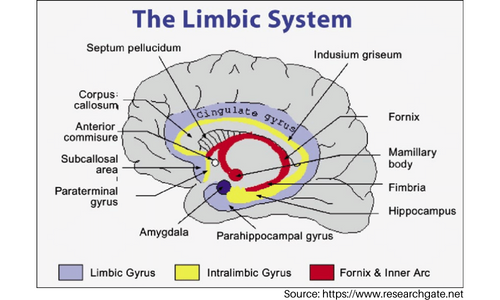How To Stop Procrastinating

Issue No. 37 | Brought to you by the Addiction Reset Community – ARC
Unlocking the secrets of processed food addiction and guiding you to find freedom from food and weight obsession.

Ever wondered why you can’t get started on your clean food-eating plan?
Most people think they are procrastinating – but they are not! The reason this is happening is because of addiction. The addiction causes the block to get started and makes it difficult to remain consistent once you do.

The process of breaking through the blockage that is stopping you from gaining control of your food and living in a healthy body starts with understanding what is happening in your brain.
What happens in the brain?
The desire to eat clean and your decision-making power to make clean food choices is located in the brain’s frontal lobe. This part only constitutes 2% of your brain power.
Another part of the brain, a much stronger part of the brain, is the limbic system, sometimes called the “reward center”. This is where the cravings are located. A craving brain is what makes it difficult to start eliminating processed food from your diet. The big food industry, which has largely been playing by the tobacco industry’s playbook, has designed foods to increase the stimulation of cravings.

Craving or thinking?
According to Dr Joan Ifland, lead author and editor of the textbook Processed Food Addiction: Foundations, Assessment and Recovery, the brain is designed to either crave or think, but cannot do both at the same time. This means when it comes to food choices, we are either under the control of our craving brain or the decision-making brain. Dr Ifland concludes that this is the single biggest reason that people can’t get started on their clean food meal plans.
We experience this as ‘procrastination’. We think we just don’t have the willpower or aren’t trying to have enough. This is simply not true!
The truth about what’s really happening
The truth is that the processed food industry has used a business model from the tobacco industry playbook which causes addiction.
In writing the textbook, Dr Ifland looked at over 6000 studies, over 2000 of which are cited in the textbook book. From her research, it is clear that when big tobacco took over big food in the 1980’s they began formulating ‘food-like’ combinations of sugar, fat and excessive salt and addictive additives, caffeine and dairy. In high quantities over extended periods, this strategy turned processed foods into addictive substances.
Being the experts of addiction - having perfected this model with cigarette addiction - the companies manufacturing processed foods also know how to train the brain to crave. Formulating highly addictive, affordable products, making them widely available and using excessive product promotion, including advertising to kids, to reach the widest repeat-user base possible.

The net result is that millions of people around the world are living with an entrenched addiction to processed foods. Research reveals over 100 sicknesses and diseases associated with processed foods including obesity, heart disease, diabetes, dementia, depression, stroke and other “lifestyle” diseases.
You are not procrastinating and you’re not weak-willed. You have an addiction that was given to you, and it is not your fault.
Triggers and Cues
The reason why your cravings are often louder than your thinking brain is that the craving brain is stimulated by triggers and cues - reminders in the environment to eat the very food that you have been trying to eliminate. Remember, as long as your brain is craving, it simply cannot think of wise choices.
You may face a myriad of cues throughout your day such as seeing people queueing at a fast food outlet on your way to work, receiving an email from a colleague inviting you for birthday “treats” in the breakroom, television programs and advertising showing processed foods, seeing these foods in your house or social gatherings and celebrations. All these are potential triggers to eating foods that you had intended to eliminate.
This repeated messaging to eat, again and again, reaches way down into the brain and conditions neurons to crave.
Taking back control
The first step in taking back control of your food is to become aware of cues and triggers. Just watch how many reminders you have that stimulate you to eat throughout your day.
Overcoming procrastination not only requires the elimination of addictive processed foods that cause cravings and loss of control, but also the management of triggers and cues that stimulate cravings.
You can overcome the effects of repetitious, cueing messaging by exposing yourself to alternate messages that help you to overcome cravings and stimulates healthy eating behaviors. Your brain needs a sufficient amount of positive recovery messaging to overcome the onslaught of messages that cue cravings.
Mirror neurons are an important part of the brain that can help with overpowering the cravings pathway. Via mirror neurons, we are able to develop alternate neural pathways by mimicking the behavior of people that we spend sufficient time with, like and trust. Through conformance drive, our innate human desire to ‘fit in”, we can retrain the addicted brain to mimic others who already have control over food and eat clean.

Immersion in a recovery support group that leverages the science of mirror neuron engagement and teaches critical skills to manage cues and triggers while retraining addicted brain cells to overcome cravings, is the key to overcoming procrastination and regaining control over food.

Within the Addiction Reset Community (ARC) our members and their journeys are important to us. We find their stories inspiring and hopeful for everybody in health recovery.
“For years I believed that there was something wrong with me. I couldn’t understand why I wasn’t able to have a ‘normal’ approach to food. No matter how many diets I tried, I just couldn’t seem to get to a place where I felt peaceful about food. I was either over-eating it, or I was severely restricting it. I just couldn’t find balance. Finding Dr Joan Ifland and the Addiction Reset Community has given me two very important things. Firstly, the relief of knowing that I am not alone in my fight against food addiction. And secondly, science-based tools and skills to finally overcome this battle. For the first time in decades, I feel hopeful that I am on the right track to finding the balance and peace that I have been searching for.”

Many people reach out to Joan asking for advice and assistance on how they can begin their recovery journey.
Dear Joan,
Why do I go back to eating processed foods when I know how much better I feel without them?
Joan responds:
Because addicted neurons are being triggered to control your behaviour against the will of your frontal lobe, where your executive decision-making is located. You can regain control by retraining the addicted brain cells and getting support to managing the triggers and cues.
DISCLAIMER:
Dr Joan Ifland (PhD) is a global expert on the subject of processed food addiction and is not a medical doctor. Information and response shared in this Newsletter are not intended for, and should not be construed as medical advice.
Do you have a question? Reach out to us with your questions about food addiction and recovery at gethelp@foodaddictionreset.com
Are you showing signs of Processed Food Addiction? Take this self-quiz to find out now!
Recent copies of Dr Joan Ifland's Blog:
Issue 01 | Issue 02 | Issue 03 | Issue 04 | Issue 05 | Issue 06 | Issue 07 | Issue 08 | Issue 09 | Issue 10 | Issue 11 | Issue 12 | Issue 13 | Issue 14 | Issue 15 | Issue 16 | Issue 17 | Issue 18 | Issue 19 | Issue 20 | Issue 21 | Issue 22 | Issue 23 | Issue 24 | Issue 25 | Issue 26 | Issue 27 | Issue 28 | Issue 29 | Issue 30 | Issue 31 | Issue 32 | Issue 33 | Issue 34 | Issue 35 | Issue 36


